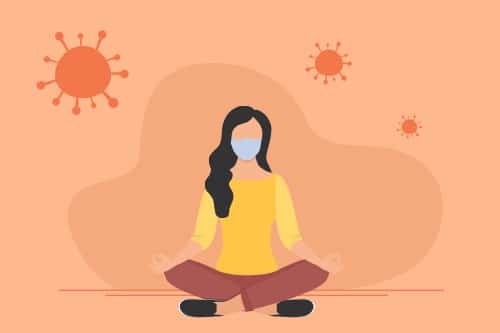How to be Resilient with the Second Wave of COVID-19? HealthifyMe Blog HealthifyMe Blog - The definitive guide to weight loss, fitness and living a healthier life.
We will not say “this too shall pass” because we understand that this is not an easy situation to deal with once again. But we are here for you. This article will help you with the much-needed mental health essentials that will help you brave through home quarantine once again. Keep scrolling to know more.
Your well-being is just a click away!
Understanding Resilience
Resilience is the ability to take on adverse life challenges, being a resilient person does not mean that they do not experience stress but it’s how quickly they engage in mental toughening by working through emotional pain, suffering and turmoil. One cannot equate resilience to a trampoline – when one moment you are down and the other moment you are up rather, it is a process that enables you to hike a mountain without a trail map. It takes time, strength, and guidance from people around you. You will experience minor setbacks, but you will eventually reach the top and see how far you have come.
Why is Resilience important?
This is the primary factor that fosters coping ability at times of crisis and trauma. It is the only factor that helps you utilize your skills to overcome challenges and work through setbacks. People who do not have resilience tend to feel very overwhelmed by simple challenges and may also mask their inabilities by unhealthy coping mechanisms such as avoidance, isolation, and most detrimental self-medication and diagnosis. Many studies have shown that people who fall under chronic psychological distress have shown lower levels of stress.
Factors of Resilience
According to the American Psychological Association, resilience is backed by these five important factors
- Gratitude: people who feel gratitude on an everyday basis tend to look at challenges as opportunities and look at passing through hurdles in the most organic way.
- Compassion: it is inevitable to have your fair share of hardships, but it is also crucial to be compassionate and kind to yourself, and such measures improve your resilience by making you less anxious.
- Acceptance: this is something most of us struggle with. Every time we face a challenge we go into the denial cycle and try to blame everything else but you, this is counterproductive to acceptance.
- Meaning: resilient persons always find a personal meaning to every challenge they face. Finding a meaning accelerates the motivation and keeps you driven to find hope at the end of the tunnel.
- Forgiveness: It is pivotal to forgive yourself and others during your course of tough times, this not only allows you to move forward but also helps you detain unnecessary baggage that may be harmful to your progress.
Types of Resilience
#1 Physical Resilience
This is along the lines of having the physical strength and stamina to face any hurdles that require physical immunity. Especially during times of a pandemic, it is important to take care of your physical health as the highest priority.
#2 Mental Resilience
To have a mental bandwidth to take on any major life crisis and to have the ability to channelize emotions rationally.
#3 Emotional Resilience
Emotional resilience is connected to emotional intelligence, emotional awareness, perseverance, acceptance, and optimism. Emotionally resilient people tend to accept adversities with flexibility and the attitude that – times are tough, but they will get better. Emotional resilience allows people to find positive things when circumstances seem grim.
#4 Social Resilience
Social resilience stems from connecting with others socially. It may include catching up with a friend, working in a team, networking, or getting involved with your community. Social resilience is built on trust, diversity, tolerance, and respect.
How are Resilience and mental health connected?
A study conducted by Springer Journal assessed the importance of resilience and its impact on the mental health spectrum. The results showed that Resilience is directly proportional to a significant increase in emotional well-being. Several empirical studies have also shown that there is when an individual scores high on resilience, there is a less likelihood of Depression, Anxiety, and Stress.
Some essential tools for improving resilience during the Second Wave of COVID-19
- Flight or Fight: In this conundrum, always look at facing your fear head straight, this will mitigate residual anxiety pangs and help you face the challenge with well equipped mental armor
- Have a moral compass: People with strong resilience have a very concrete sense of right and wrong. They also exude a strong sense of ethics in every facet of life.
- Being Optimistic: Seeing the good in every bad situation is a niche skill to have. Highly resilient people try to remain focused and positive in any given challenging situation. At a time like pandemic and with the cases going up every day, it is extremely important to monitor your screen time
- Find the Inner you: With everything that is going on currently, it gets difficult to find ourselves and tap that inner peace. So take some time out, even if it is for five minutes a day. Practice some deep breathing to keep anxiety at bay.
- Resilient role models: This need not be a superhero or a celebrity, looking for role models around you can help you equip yourself with the right set of skills to face any crisis.
- Get Cognitively flexible: Resilient people use many ways to cope with stressful situations rather than sticking to just one. For eg: if there is a scare of contracting coronavirus, resilient people first internalize the thought and see the possible traces and further treatment
- Physical exercise: Exercise helps you channelize your challenges and keep the anxiety related to covid at an optimum level. With home quarantine, try to find one corner where you can start simple workouts for at least twenty minutes a day.
- Find a “meaning” to what you do: At times of crisis, it is important to stay positive. Take breaks on a regular basis from work and spend quality time with your family. Check in on your mental health from time to time and seek professional help if it gets too overwhelming.
Conclusion
Nobody is born resilient, we have to put in conscious efforts on a daily basis to get there. It is really hard to put on armor once again to try to be strong when we know the second wave is much more adamant. But let us keep in mind that we are together and what we can hopefully do is to try to stay resilient for ourselves and our family. We are only a click away to help you deal with these unsettling and testing times.
Frequently Asked Questions (FAQ’s)
A. Yes, we have a wide range of assessment pool, you can always reach out to us to know more.
A. We can completely understand how you feel, the first thing you can try to do is restrict media consumption and then immediately check in with our counselors to apply immediate psychological first aid.
A. This is found to be a common streak of panic from the onset of COVID-19. This can be well addressed in one-person sessions. Reach out to us to know more.
The post How to be Resilient with the Second Wave of COVID-19? appeared first on HealthifyMe Blog.
from HealthifyMe Blog https://ift.tt/3tR2oM4






Post a Comment
Post a Comment